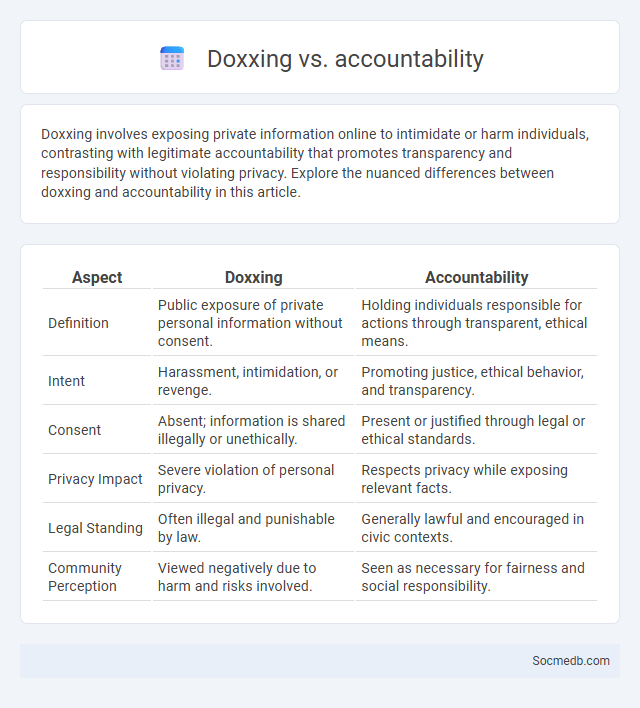
Photo illustration: doxxing vs accountability
Doxxing involves exposing private information online to intimidate or harm individuals, contrasting with legitimate accountability that promotes transparency and responsibility without violating privacy. Explore the nuanced differences between doxxing and accountability in this article.
Table of Comparison
| Aspect | Doxxing | Accountability |
|---|---|---|
| Definition | Public exposure of private personal information without consent. | Holding individuals responsible for actions through transparent, ethical means. |
| Intent | Harassment, intimidation, or revenge. | Promoting justice, ethical behavior, and transparency. |
| Consent | Absent; information is shared illegally or unethically. | Present or justified through legal or ethical standards. |
| Privacy Impact | Severe violation of personal privacy. | Respects privacy while exposing relevant facts. |
| Legal Standing | Often illegal and punishable by law. | Generally lawful and encouraged in civic contexts. |
| Community Perception | Viewed negatively due to harm and risks involved. | Seen as necessary for fairness and social responsibility. |
Understanding Doxxing: Definition and Origins
Doxxing refers to the act of publicly revealing private or personal information about an individual without their consent, often with malicious intent. Originating from the hacker culture in the 1990s, the term "dox" comes from "dropping docs," meaning to expose someone's documents or sensitive data online. Understanding doxxing is crucial for protecting your digital privacy and preventing potential harassment or identity theft on social media platforms.
The Concept of Accountability in the Digital Age
The concept of accountability in the digital age centers on the responsibility of individuals, corporations, and platforms to manage content ethically and transparently on social media. Digital accountability includes monitoring misinformation, protecting user privacy, and enforcing community standards through algorithms and human oversight. Emerging frameworks emphasize regulatory compliance and promote digital literacy to hold stakeholders accountable for their online actions and influence.
Personal Information Doxxing: What It Entails
Personal information doxxing involves the malicious act of publicly sharing someone's private details, such as home address, phone number, or financial data, on social media platforms without consent. This exposure can lead to harassment, identity theft, or even physical danger. Protecting your personal data with strong privacy settings and cautious online sharing is crucial to prevent being targeted by doxxers.
Key Differences Between Doxxing and Accountability
Doxxing involves publicly exposing someone's private information without consent, often to intimidate or harass, whereas accountability on social media entails holding individuals or organizations responsible for their actions through transparent and respectful discourse. While doxxing breaches privacy and can lead to real-world harm, accountability promotes ethical behavior by encouraging open dialogue and fact-based criticism. Understanding these distinctions is crucial for maintaining a safe and constructive online environment.
The Risks and Consequences of Doxxing
Doxxing involves the malicious release of your private information online, leading to serious risks such as identity theft, harassment, and safety threats. The consequences extend to emotional distress, reputational damage, and potential legal issues impacting both personal and professional lives. Protecting your digital privacy and being vigilant about sharing sensitive details can minimize vulnerabilities to doxxing attacks on social media platforms.
When Accountability Becomes Doxxing
When accountability on social media crosses into doxxing, it shifts from legitimate criticism to harmful invasion of privacy, exposing personal information without consent. This practice often leads to harassment, threats, and real-world consequences that extend beyond digital spaces. Understanding the line between holding individuals responsible and violating their privacy is crucial for ethical online interactions and maintaining trust in social platforms.
Legal Perspectives on Doxxing and Data Protection
Doxxing involves the unauthorized publication of private or identifying information, raising significant legal concerns under data protection laws such as the GDPR and CCPA. Legal frameworks emphasize the right to privacy and impose strict penalties for breaches, including fines and criminal charges for malicious actors distributing sensitive personal data. Courts increasingly recognize doxxing as a violation of personal data rights, prompting social media platforms to enhance policies and implement technological safeguards to prevent data misuse and protect users' confidentiality.
Ethical Considerations: Public Interest vs Privacy
Balancing public interest and privacy on social media requires stringent ethical standards to protect individual rights while fostering transparent information sharing. Platforms must implement robust data protection policies and ensure informed consent to prevent misuse of personal information. Transparent algorithms and accountability mechanisms are essential to uphold user trust and mitigate privacy violations.
Protecting Yourself from Personal Information Doxxing
Protecting yourself from personal information doxxing on social media requires rigorous privacy settings to restrict access to your profiles and posts. Avoid sharing sensitive details such as your home address, phone number, or financial information publicly, and be cautious about accepting friend requests or messages from unknown users. Regularly monitor your digital footprint through search engines and set up alerts to quickly detect and respond to unauthorized sharing of personal data.
Building Responsible Online Communities
Building responsible online communities requires fostering respectful interactions, enforcing clear guidelines, and promoting digital literacy among users. Platforms must implement robust moderation tools and encourage accountability to minimize harmful behaviors such as harassment and misinformation. Empowering users with transparent reporting mechanisms helps sustain a positive, inclusive social media environment.
 socmedb.com
socmedb.com